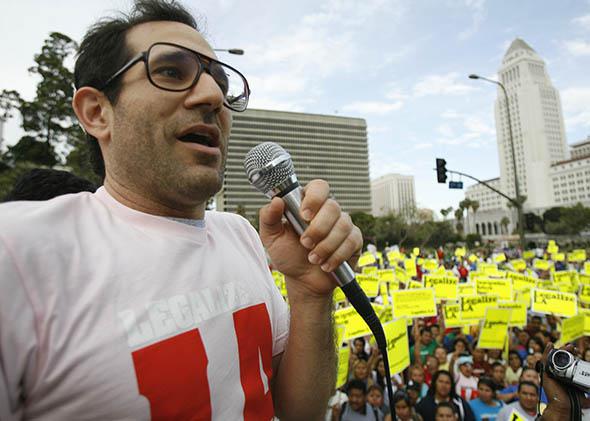Last week, after a decade of sexual harassment allegations against American Apparel founder and CEO Dov Charney—and countless brazen media appearances where he copped to soliciting sexual favors from employees and embraced his “dirty guy” persona—Charney was finally axed by his company’s board. What took so long? Today, the New York Times parses the factors behind the board’s decision. It was a little bit about harassment. But it was mostly about money.
“The combination of being a virtual outlaw and losing money is not a combination which you can persist with for long,” John C. Coffee Jr., a professor at Columbia Law School and an expert on corporate governance, told the Times. “I think your margin for error shrinks once you begin to lose money, and you have all your constituencies concerned about the future. It’s realpolitik.”
That’s just one guy’s theory, but the Times’ reporting backs it up.
On the surface, the board’s decision was directly sparked by a sexual harassment finding against Charney. American Apparel forces its employees to bring claims against the company in private arbitration, not in the courts. That means that the results of any sexual harassment allegations were kept secret and, in many cases, ended in settlement agreements even before the arbitrator could determine whether Charney was at fault. (In one case, Charney’s lawyers offered a former employee who claims she was sexually harassed by Charney $1.3 million to agree to allow him to publicly announce that he was found innocent of her charges; the arrangement hit the press after the employee backed out of the deal). The process left the company’s board with “very little in the way of established legal fact,” the Times reports. But this year, one of these arbitrated disputes finally resulted in a firm ruling against Charney: An arbitrator found Charney responsible for “defamation for failing to stop the publication of naked photographs of a former employee.” She was awarded about $700,000, and the board finally had the ammunition to fire its CEO.
But in the background, it was flagging profits that forced the board to act. In 2007, shares of American Apparel were worth $15; last year, they plummeted to a low of 47 cents a share. The company lost $106 million in 2013, and as it scrambled to secure more capital, interest rates on its loans spiked to 20 percent. “For years, Mr. Charney’s reputation made lenders skittish about working with his company, and some refused outright,” the Times reports. “Many observers and former insiders have questioned how the business could possibly generate enough cash to sustain its interest payments with the rates so high.” Meanwhile, Charney’s “management style” reportedly impeded American Apparel from attracting top employees to help turn the company around, as it “had developed a reputation as a place where talented people did not want to work.”
In years past, even if the board had good reason to fire Charney based on his behavior alone, “it did not have the appetite to remove the company’s driving creative force,” the Times reports. Only once the company lost enough money did that calculation change. By creating a sexually charged corporate culture, Charney made American Apparel a fashion phenomenon. That culture also ensured that Charney was the only person around who seemed capable of keeping the company a success, until the atmosphere he fostered started to backfire. Charney’s practices only caught up to him when they stopped being bankable—just like other moneymakers with harassing reputations. Given the history, it seems doubtful that the board was really moved by the sexual harassment allegations. Sex sells until it’s bad for business.
